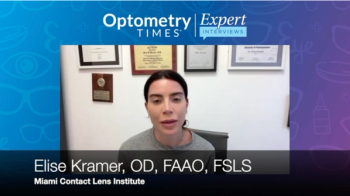
G360 2023: A bird’s eye view of innovation
Kristen Ingenito, MBA, gives key takeaways from her G360 presentation, "A bird’s eye view of innovation."
Kristen Ingenito, MBA, sat down with Sheryl Stevenson, group editorial director of eye care brands at MJH Life Sciences, the parent company of Optometry Times, to share highlights from her 2023 Glaucoma 360 presentaion, "A bird’s eye view of innovation."
Editor's note: This transcript has been lightly edited for clarity.
Stevenson:
We're joined today with Kristen Ingenito, who is vice president and director of ophthalmics at Market Scope. Kristen, it's great to see you. We look forward to learning more about your talk at this year's New Horizons Forum.
Ingenito:
Sure, Sheryl, thanks for having me. I'm really excited for this forum. It's been such a great way to share ideas and discuss the glaucoma market. So this year, [I'm] kind of doing a bird's eye view of technology. There's been so many new entrants into the market in the last 12 months and even in the last couple of years, frankly, that it's just started to change the industry. It's changed where procedures are being done, how they're being done, and how we're addressing patients.
I wanted to dive into a little bit of that to see how that change is affecting all of us. One of the things that we've noticed is just the sheer volume of doctors now that are offering these interventional glaucoma procedures, MIGS, canal based, stents, we can call them all sorts of lots of different categories you can have here.
With this being adopted by cataract surgeons, we've expanded beyond this idea of just glaucoma surgeons addressing glaucoma patients. Now we have just a wider variety of doctors that are addressing these patients. With that comes greater adoption, obviously, and more procedures being done. That's been interesting to see.
And then also this mix-and-match idea of being able to mix stents with canal based and now we're doing this with cataract surgery, and sometimes you're doing them standalone. So understanding that mix and seeing the devices that are most likely to be combined to create an effective treatment for patients is interesting.
One of the things that I think is a really big challenge for the glaucoma space is the sheer volume of choices that these doctors have to make and treating these patients. Even if we just look at interventional glaucoma surgical and therapeutic lasers, even if we're just looking at that, we're looking at 23-ish options for doctors. When you add medicine into there—which is obviously the biggest part of this revenue of the glaucoma market is glaucoma pharmaceuticals—if you add those into the mix, the sheer volume of choices is just staggering.
I think this provides a really unique opportunity for digital technology, for data analytics, for looking at the results of studies and trying to understand how we can best pair those treatment modalities up with patients so we have effective and efficient treatment options available to us, and easily so we know which direction to go or so doctors know which direction to go. Nobody wants me treating glaucoma. I always talk about this in terms of me doing it, but I'm not obviously.
I think that's a really interesting opportunity and I know that there's work being done but we also know that studies and research design can change treatment paradigms. The LiGHT study coming out and showing the effectiveness of SLT as a first-line therapy. This changes a little bit of how doctors are treating patients. I think there's a lot of opportunity there. I'm excited to see how that happens and how glaucoma research can affect how we're treating patients in the future.
Stevenson:
What are some of the most emerging trends that you are identifying right now, or are seeing?
Ingenito:
That's a great question. I think we've seen some switch in the kind of mix of drugs in pharmaceutical revenues. Some of the newer players on the market—the rho kinase inhibitors and alpha agonists—these have grown in terms of revenue for the glaucoma pharmaceuticals market, which is interesting. Obviously, fixed-combo drugs continues to be a mainstay. I think the availabilities of generic prostaglandins and other therapies here is going to help drive those costs down for patients, which is great.
We have seen a big growth in canal surgery devices. We started splitting this out. It used to be we were just looking at MIGS but as the technology kind of evolves, we have to change the categories, frankly. Now canal surgery devices are the fastest-growing segment, revenue-wise, within ophthalmology. They're growing at almost 25% is our projection over the next 5 years is that combined annual growth rates that we're seeing just really outpacing the ophthalmic industry as a whole. That's exciting and there's lots of new options. There's been a lot that have gotten market access in the last 6 to 12 months even.
I would say canal-based procedures growing and outpacing MIGS at this point and also just the sheer volume of cataract surgeons that are now offering interventional glaucoma procedures. I think we'll continue to see those procedure volumes grow simply because the number of doctors is growing who are offering them.
Newsletter
Want more insights like this? Subscribe to Optometry Times and get clinical pearls and practice tips delivered straight to your inbox.













































